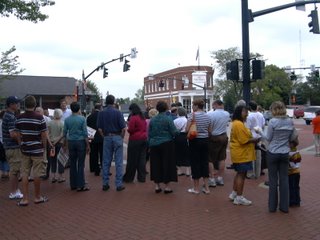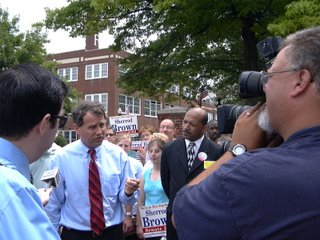Today at noon, U.S. Rep. and Senate candidate Sherrod Brown held a press conference in North Canton to announce that he has introduced a new bill in Congress: H.B. 5635, the Decent Working Conditions and Fair Competition Act. The bill aims to prevent goods manufactured in “sweatshops” from being sold in the United States.
Today’s North Canton announcement was pretty much a press and visibility event. The campaign sent out a flash late last week and got a fairly decent showing of labor folks, young Dems, Dem club members and politicos. By the time the event was on, it looked like a crowd of fifty or so. The usual suspects in the press were there – Canton Repository, Canton’s WHBC radio, Akron/Canton TV news and Carl Chancellor from ABJ.
Against all expectations I was able to work childcare miracles and get down there in time. Here’s how it went. A couple minutes after noon Sherrod Brown arrives and immediately greets union leaders and Stark County party chair Johnnie Maier. He spends ten minutes or so working the crowd, talking to union folks and Dem activists as well as the VIPs.
A couple minutes after noon Sherrod Brown arrives and immediately greets union leaders and Stark County party chair Johnnie Maier. He spends ten minutes or so working the crowd, talking to union folks and Dem activists as well as the VIPs. I’ve said it before; this is Sherrod at his best. While he would have lost a one-on-one to the preternaturally charismatic Paul Hackett, it’s important to remember that he has serious game: tousle-haired, boyish good looks and the ability to convey to each successive conversation partner that listening to him or her is the most important thing Sherrod will do all day. In short, he’s a natural at person-to-person campaigning. How that translates to the inevitable media campaign in a statewide race remains to be seen.
I’ve said it before; this is Sherrod at his best. While he would have lost a one-on-one to the preternaturally charismatic Paul Hackett, it’s important to remember that he has serious game: tousle-haired, boyish good looks and the ability to convey to each successive conversation partner that listening to him or her is the most important thing Sherrod will do all day. In short, he’s a natural at person-to-person campaigning. How that translates to the inevitable media campaign in a statewide race remains to be seen.
Around 12:15 Brown starts speaking. He opens with “I firmly believe that American workers can compete if they are on a level playing field” – an admirable bit of speechcraft. He briefly outlines the proposal, then starts after DeWine: He is supported by the big corporations that outsource jobs and he has supported job-killing trade agreements.
He casts this as a debate about which side you are on – the workers versus the corporations. He runs through the painfully familiar story of community erosion in Ohio – loss of jobs, whittling of tax base, residents leaving, more jobs go. It’s the backstory behind the shrinking of Ohio’s cities.
Brown then introduces Thomas Ward West, a member of Canton’s City Council and candidate for the Ohio Senate. I interviewed Ward after the event and will post separately on him. He spoke briefly in support of Brown and gubernatorial candidate T-d S--------d.
With that, the floor opens to the crowd. None of the press have any questions. A couple of citizens ask questions off topic, that allow Brown to make points that we need to address trade to address illegal immigration and that the U.S. isn’t enforcing our own labor laws. I was able to ask whether the bill is consistent with the current trade regime. Brown says that the bill is written to be WTO compliant, but he hopes it will lead to a reassessment of trade policy generally.
After the event, I was able to interview Rep. Brown briefly. Here’s the Q&A:
Q: How are “sweatshops” defined? A: Basically it’s the definition contained in the International Labor Organization standards. Those standard have five elements
-Right of association
-Right to organize
-Prohibition of forced labor
-Prohibition of child labor
-Prohibition of discrimination
Q: You’ve mentioned DeWine’s support for trade agreements and the pay-for-play culture. Do you have a “smoking gun” link between support for DeWine and his trade votes? A: Certainly DeWine does receive support from companies that outsource, and certainly he continues to support the President as more and more trade agreements are brought before Congress.
Q: How are the provisions in the bill enforced? A: Three ways. The Federal Trade Commission has enforcement authority. In addition, competitors have a private right of action. [in response to follow-up question] The competitor right of action extends to retail companies – CostCo can sue WalMart. Finally, a shareholder of an offending corporation can sue.
Q: The upside of trade for US companies is intellectual property protection, and it’s an important concern of tech industries that are at least a potential Democratic constituency. How do we reconcile concerns about trade with protecting IP? A: I feel strongly that we should use the full force of the government to protect intellectual property, but we need to protect workers as well.
ASSESSMENT: I haven’t analyzed the finer points of H.B. 5635 and don’t intend to. In a Republican Congress, this bill doesn’t have a prayer of getting out of committee. But it’s an election-year policy statement that doesn’t offend the militant pragmatist.
I admire Sherrod’s ability to engage in an essentially populist campaign without resorting to simple-minded shibboleths. He criticizes trade agreements without falling back on a purely protectionist model. It’s a subtlety of thought that appeals to me as well as to rank-and-file union guys. That’s a hell of a feat.
RIP, JOHN OLESKY
1 year ago



3 comments:
Thanks for this, Scott. Sounds to me like you are the kind of person who can ask the kind of questions that play to Sherrod's strength which, from what I've heard, is his knowledge, experience and, for lack of a better word - and I don't mean it in a negative way - his wonkiness, without totally alienating the people you say he goes hand to hand to say hello.
shibboleths
Had to look that one up. Scott, you're in fine competition with Jill and Grandpaboy in using words that this scott needs to look up.
O2: You gave me credit, so no worries. Thanks for letting me know. Glad you liked the post and I liked your comments.
Scott: Yes, and unlike Jill I don't bother to embed a link to the definition if I drop in a 50-center. My bad.
Post a Comment